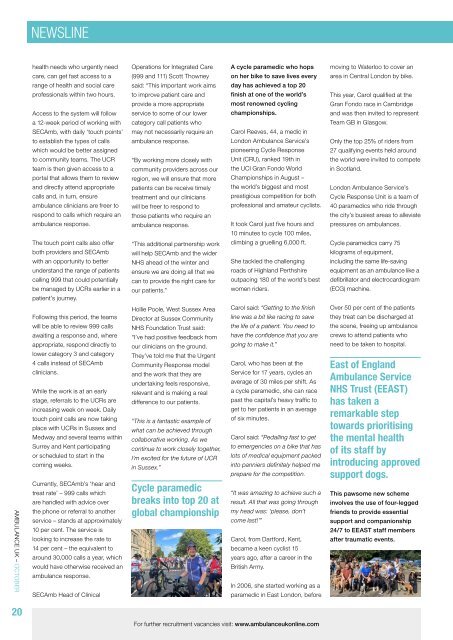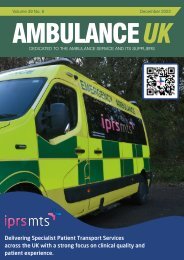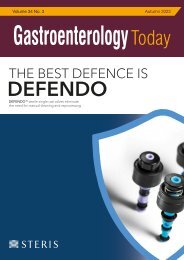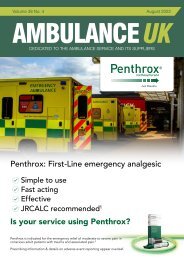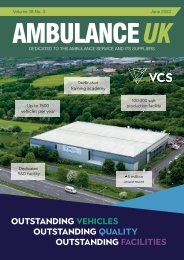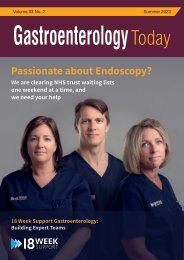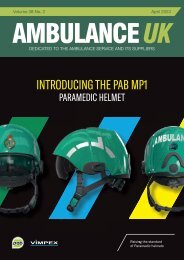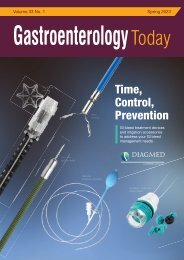Ambulance UK October 2023
You also want an ePaper? Increase the reach of your titles
YUMPU automatically turns print PDFs into web optimized ePapers that Google loves.
NEWSLINE<br />
health needs who urgently need<br />
care, can get fast access to a<br />
range of health and social care<br />
professionals within two hours.<br />
Access to the system will follow<br />
a 12-week period of working with<br />
SECAmb, with daily ‘touch points’<br />
to establish the types of calls<br />
which would be better assigned<br />
to community teams. The UCR<br />
team is then given access to a<br />
portal that allows them to review<br />
and directly attend appropriate<br />
calls and, in turn, ensure<br />
ambulance clinicians are freer to<br />
respond to calls which require an<br />
ambulance response.<br />
The touch point calls also offer<br />
both providers and SECAmb<br />
with an opportunity to better<br />
understand the range of patients<br />
calling 999 that could potentially<br />
be managed by UCRs earlier in a<br />
patient’s journey.<br />
Operations for Integrated Care<br />
(999 and 111) Scott Thowney<br />
said: “This important work aims<br />
to improve patient care and<br />
provide a more appropriate<br />
service to some of our lower<br />
category call patients who<br />
may not necessarily require an<br />
ambulance response.<br />
“By working more closely with<br />
community providers across our<br />
region, we will ensure that more<br />
patients can be receive timely<br />
treatment and our clinicians<br />
will be freer to respond to<br />
those patients who require an<br />
ambulance response.<br />
“This additional partnership work<br />
will help SECAmb and the wider<br />
NHS ahead of the winter and<br />
ensure we are doing all that we<br />
can to provide the right care for<br />
our patients.”<br />
A cycle paramedic who hops<br />
on her bike to save lives every<br />
day has achieved a top 20<br />
finish at one of the world’s<br />
most renowned cycling<br />
championships.<br />
Carol Reeves, 44, a medic in<br />
London <strong>Ambulance</strong> Service’s<br />
pioneering Cycle Response<br />
Unit (CRU), ranked 19th in<br />
the UCI Gran Fondo World<br />
Championships in August –<br />
the world’s biggest and most<br />
prestigious competition for both<br />
professional and amateur cyclists.<br />
It took Carol just five hours and<br />
10 minutes to cycle 100 miles,<br />
climbing a gruelling 6,000 ft.<br />
She tackled the challenging<br />
roads of Highland Perthshire<br />
outpacing 180 of the world’s best<br />
women riders.<br />
moving to Waterloo to cover an<br />
area in Central London by bike.<br />
This year, Carol qualified at the<br />
Gran Fondo race in Cambridge<br />
and was then invited to represent<br />
Team GB in Glasgow.<br />
Only the top 25% of riders from<br />
27 qualifying events held around<br />
the world were invited to compete<br />
in Scotland.<br />
London <strong>Ambulance</strong> Service’s<br />
Cycle Response Unit is a team of<br />
40 paramedics who ride through<br />
the city’s busiest areas to alleviate<br />
pressures on ambulances.<br />
Cycle paramedics carry 75<br />
kilograms of equipment,<br />
including the same life-saving<br />
equipment as an ambulance like a<br />
defibrillator and electrocardiogram<br />
(ECG) machine.<br />
AMBULANCE <strong>UK</strong> – OCTOBER<br />
Following this period, the teams<br />
will be able to review 999 calls<br />
awaiting a response and, where<br />
appropriate, respond directly to<br />
lower category 3 and category<br />
4 calls instead of SECAmb<br />
clinicians.<br />
While the work is at an early<br />
stage, referrals to the UCRs are<br />
increasing week on week. Daily<br />
touch point calls are now taking<br />
place with UCRs in Sussex and<br />
Medway and several teams within<br />
Surrey and Kent participating<br />
or scheduled to start in the<br />
coming weeks.<br />
Currently, SECAmb’s ‘hear and<br />
treat rate’ – 999 calls which<br />
are handled with advice over<br />
the phone or referral to another<br />
service – stands at approximately<br />
10 per cent. The service is<br />
looking to increase the rate to<br />
14 per cent – the equivalent to<br />
around 30,000 calls a year, which<br />
would have otherwise received an<br />
ambulance response.<br />
SECAmb Head of Clinical<br />
Hollie Poole, West Sussex Area<br />
Director at Sussex Community<br />
NHS Foundation Trust said:<br />
“I’ve had positive feedback from<br />
our clinicians on the ground.<br />
They’ve told me that the Urgent<br />
Community Response model<br />
and the work that they are<br />
undertaking feels responsive,<br />
relevant and is making a real<br />
difference to our patients.<br />
“This is a fantastic example of<br />
what can be achieved through<br />
collaborative working. As we<br />
continue to work closely together,<br />
I’m excited for the future of UCR<br />
in Sussex.”<br />
Cycle paramedic<br />
breaks into top 20 at<br />
global championship<br />
Carol said: “Getting to the finish<br />
line was a bit like racing to save<br />
the life of a patient. You need to<br />
have the confidence that you are<br />
going to make it.”<br />
Carol, who has been at the<br />
Service for 17 years, cycles an<br />
average of 30 miles per shift. As<br />
a cycle paramedic, she can race<br />
past the capital’s heavy traffic to<br />
get to her patients in an average<br />
of six minutes.<br />
Carol said: “Pedalling fast to get<br />
to emergencies on a bike that has<br />
lots of medical equipment packed<br />
into panniers definitely helped me<br />
prepare for the competition.<br />
“It was amazing to achieve such a<br />
result. All that was going through<br />
my head was: ‘please, don’t<br />
come last!’”<br />
Carol, from Dartford, Kent,<br />
became a keen cyclist 15<br />
years ago, after a career in the<br />
British Army.<br />
In 2006, she started working as a<br />
paramedic in East London, before<br />
Over 50 per cent of the patients<br />
they treat can be discharged at<br />
the scene, freeing up ambulance<br />
crews to attend patients who<br />
need to be taken to hospital.<br />
East of England<br />
<strong>Ambulance</strong> Service<br />
NHS Trust (EEAST)<br />
has taken a<br />
remarkable step<br />
towards prioritising<br />
the mental health<br />
of its staff by<br />
introducing approved<br />
support dogs.<br />
This pawsome new scheme<br />
involves the use of four-legged<br />
friends to provide essential<br />
support and companionship<br />
24/7 to EEAST staff members<br />
after traumatic events.<br />
20<br />
For further recruitment vacancies visit: www.ambulanceukonline.com


